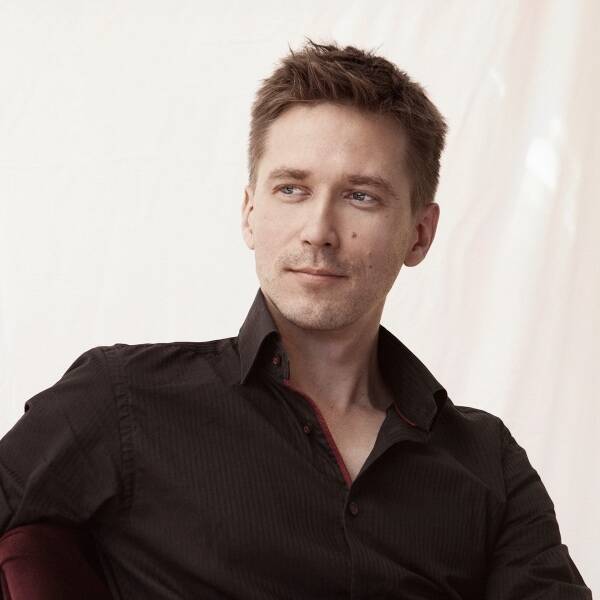Vashon Center for the Arts will present its 2nd annual Piano Fete from July 5 to 8, in its Kay White Hall.
The series, with four pianists and two pianos, has been curated by Vyacheslav Gryaznov — better known to island fans as Slava — who made his Vashon debut in 2018.
The series will feature Gryaznov, Konstantin Soukhovetski, Rexa Han, and Katya Kramer-Lapin.
In the coming weeks, The Beachcomber will present a series of interviews with all four pianists, conducted by islander Michael Tracy, starting with the following interview of Gryaznov. Tracy is a local musicologist and trusted advisor for VCA’s curation of classical music programs.
In the four-day Piano Fete, we’ll hear transcriptions of three Russian greats: Rimsky-Korsakov, Rachmaninoff, and Stravinsky. Tell us a bit about Rimsky-Korsakov’s opera “Kitezh,” which is not well known by American audiences — but I think its storyline is apropos in light of the war in Ukraine. Is this transcription based on the orchestral suite or directly from the opera?
My arrangement of “Kitezh” for two pianos is a mixture based on the suite Rimsky-Korsakov wrote, and my own structural ideas for the opera. It features a solo piano cadenza after the battle scene. The full name of the opera is “The Legend of the Invisible City of Kitezh and the Maiden Fevroniya,” — the longest opera title I’ve ever seen. Yes, it seems to be a reflection on what’s happening right now between Ukraine and Russia — the only difference is that we need to flip the story upside down: now it is Russia who is the aggressor.
Rimsky-Korsakov himself called it his last artistic statement, despite writing another opera which is far better known nowadays, “Golden Cockerel.” I personally love “Kitezh” due to its pure Russian identity, ideas, and harmonic and melodic language. I believe it represents the best side of Russia.
Stravinsky’s “Rite of Spring” is often considered the beginning of 20th-century modern music when it premiered in Paris in 1913. Even for the most expert orchestras, this piece is a major technical challenge, given its unique rhythms and syncopations.How do you capture the spirit of a pagan sacrifice with two keyboards?
I wanted to “sacrifice” two pianos in my arrangement, and I wrote it in a way that explores and explodes what are the limits of the instrument in terms of energy and the percussive element in it. I have to say I really enjoyed diving into such a barbarian area of Russian ethnic culture.
Preserving an intimate atmosphere of a four-hand piano ensemble, two pianos add an incredible amount of raw power which this piece demands so much.
That’s why I created an uncompromised version for two pianists that can express the wildest beauty of this work in a non-restricted way.
On Piano Fete’s final day, you’ll perform your arrangement of a Pushkin poem with the Vashon-Maury Chamber orchestra followed by your piano and orchestra arrangement of Gershwin’s “Porgy & Bess.” However, with this arrangement, the orchestra will be instead a digital orchestra you control yourself.
We have a different and very unusual project for the Vashon Maury Chamber Orchestra, “The Snowstorm,” by Georgy Sviridov, which will show a different perspective on Russia.Sviridov based the piece on a famous Pushkin poem “Snow Storm” or “Blizzard.” My arrangement is done specially for the local chamber musicians and two pianos.
“Rhapsody in Black” is a piece that requires a full orchestra and drummer and bassist, and in this project, I’m testing the possibilities of my own digital orchestra. It was written in 2011, initially as a 20-minute, two-piano piece. I wrote it for a well-known piano duo in Russia. But the idea eventually transformed into a full-blown piano concerto with a symphony orchestra.
I didn’t want to produce any sort of suite, which will just jump from one famous melody to another. I created a whole new story — what if we follow Porgy all the way to New York and see what happens with him and Bess there? My idea for “Black Rhapsody” was to create a coherent piece with its own story: about a man with a disabled body but a fervent soul; about his dreams, beliefs, and journey to his goal. It is also about a beautiful woman with a beautiful soul but torn by passions and limited by her weakness. It is about the end of his dreams, and the end of her inner turmoil.
Find out more about Piano Fete and get tickets at vashoncenterforthearts.org.
Correction: A previous version of this article contained a misspelling of Konstantin Soukhovetski’s name. It is corrected here. We regret the error.



